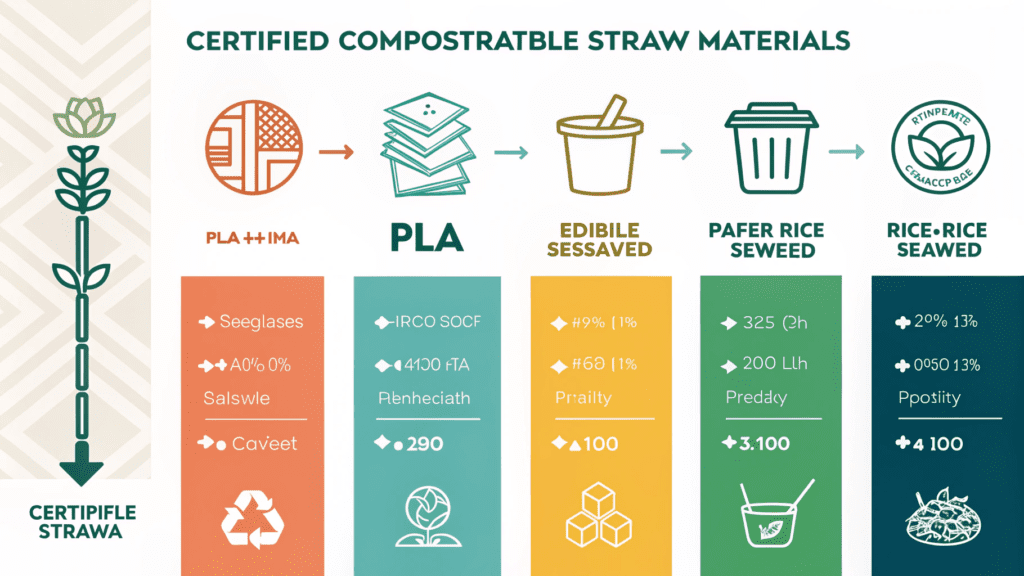
By a Senior B2B Sustainability Content Strategist
The global imperative to reduce plastic waste has escalated from an environmental concern to a critical business challenge, reshaping supply chains and procurement strategies worldwide. As plastic pollution continues to rise, projected to reach 1.2 billion tonnes by 2050 without intervention (UN Environment Programme, 2018), legislative pressures and consumer preferences are rapidly shifting towards sustainable alternatives. For B2B leaders in procurement, operations, and sustainability within the hospitality & foodservice industries, understanding the nuances of these alternatives – particularly compostable straws – is no longer optional but a strategic necessity.
The market for compostable straws is experiencing significant growth, fueled by stringent environmental regulations such as the EU Single-Use Plastics Directive (2019/904), which mandated a ban on plastic straws since 2021. This directive, alongside similar bans in numerous U.S. states and cities like Seattle and San Francisco, has created a clear mandate for businesses to transition. Failure to adapt risks not only non-compliance penalties but also significant reputational damage and diminished market access for hotels, cafes, and airlines.
This comprehensive guide delves into the diverse materials composing compostable straws, elucidating their properties, operational implications, and strategic considerations for B2B adoption, ensuring your organization can navigate this evolving landscape with confidence and a clear competitive edge.Understanding compostable straw materials is crucial for hospitality and foodservice to ensure compliance and competitive advantage.
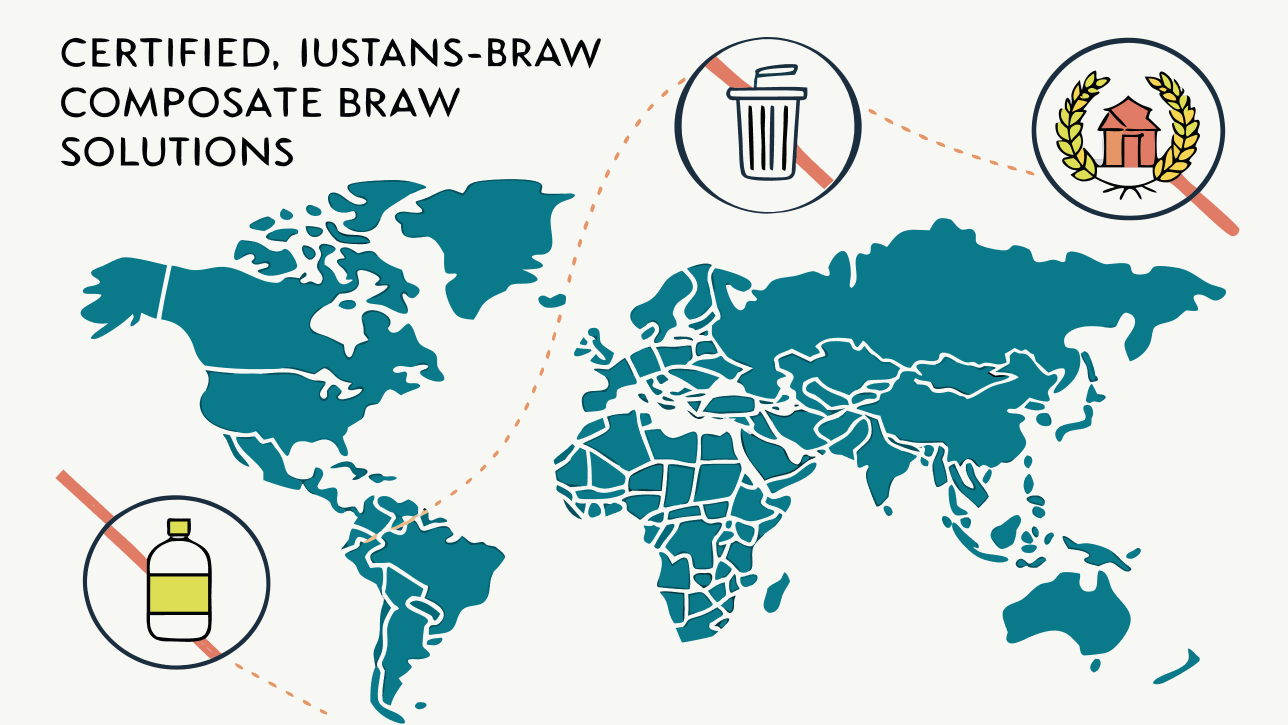
Understanding Compostability: Crucial Distinctions for Procurement Managers
The terms “biodegradable” and “compostable” are often used interchangeably, yet they denote fundamentally different characteristics with significant implications for environmental impact and regulatory compliance. For procurement managers in hospitality, understanding these distinctions is paramount.
Differentiating Biodegradable from Compostable: Standards Matter
Truecompostablematerials are scientifically verified to break down into natural components—carbon dioxide, water, and biomass—under specific composting conditions (e.g., high heat, microbial activity). Crucially, this process must occur within a defined timeframe, typically 180 days or less, and leave no toxic residues. This rigorous standard ensures the material genuinely returns to nature, contributing to healthy soil.
In contrast, “biodegradable” is a broader, often unregulated term. While a material might eventually break down, this could take decades or even centuries, and it offers no guarantee that it won’t leave behind microplastics or harmful byproducts. Without specific certification, a “biodegradable” claim can be misleading, potentially undermining a hotel or restaurant’s sustainability efforts.
Navigating Certification Bodies and Regulatory Compliance: ASTM D6400 & EN 13432
To ensure genuine compostability, businesses must rely on products certified by reputable third-party organizations. In North America, theBiodegradable Products Institute (BPI)is the leading certification body, verifying products that meetASTM D6400ouASTM D6868standards for commercial composting. These standards ensure products decompose completely and safely in municipal and commercial composting facilities, leaving no harmful residues.
In Europe,TÜV AUSTRIA (OK compost INDUSTRIAL/HOME)etDIN CERTCOare key certification bodies, ensuring compliance with the European standardEN 13432. This standard mandates at least 90% disintegration within 12 weeks and 90% biodegradation within six months, alongside strict limits on chemical composition, heavy metals, and ecotoxicity. It’s critical to note that theDirective européenne sur les plastiques à usage unique (2019/904), enforced since 2021, explicitly prohibits single-use plastic straws even if they are labeled “bio-sourced” or “home compostable.” This means certified compostable straws are the only compliant alternative to conventional plastic for European hospitality venues. Similarly, in the U.S., while there’s no federal ban, states like California and New York, and cities such as Seattle and San Francisco, have prohibited plastic straws and incentivize the switch to certified compostable products through various measures, directly impacting procurement for foodservice operations.Certified compostable straws meet strict standards, ensuring genuine environmental benefits and regulatory compliance for hospitality.

Core Compostable Straw Materials: A Deep Dive into Plant-Based Innovation for Supply Chains
The innovation in compostable straw materials has expanded significantly, offering a diverse array of plant-based solutions. Each material presents unique properties suitable for different operational needs and sustainability goals within the hospitality and foodservice supply chains.
Polylactic Acid (PLA) Compostable Straw Materials: A Widely Adopted Bioplastic
Polylactic Acid (PLA) is one of the most widely adopted bioplastics for compostable straws. Derived from renewable resources such as corn starch, sugarcane, or cassava, PLA offers a plastic-like feel and functionality, making it a familiar transition from traditional petroleum-based plastics for cafes and restaurants. PLA straws are rigid and ideal for cold drinks, maintaining their structural integrity without becoming soggy. They dominate the market due to their widespread availability, biodegradability, and high durability for cold applications.
However, a key consideration for PLA is its composting requirement: it necessitates commercial composting facilities, operating at specific high temperatures (56-60°C), for effective breakdown. While biodegradable, PLA will take several years to decompose at room temperature or in natural environments if not properly processed, which is a challenge for diverse hospitality waste streams.
Polyhydroxyalkanoates (PHA) Compostable Straw Materials: The Revolutionary Biopolymer
Polyhydroxyalkanoates (PHA) represent a newer, more revolutionary class of bioplastics. Produced by bacteria fermenting plant sugars or oils, PHA boasts superior versatility in its decomposition. Unlike PLA, PHA straws are designed to decompose not only in industrial composting facilities but also in home composting environments and even marine settings, offering unparalleled flexibility for hotels and cruise lines.
PHA straws are flexible, highly durable, and exhibit high heat resistance, making them suitable for both hot and cold beverages. While currently more expensive to produce than PLA, PHA is considered a groundbreaking option for brands focused on comprehensive sustainability and future-proof compliance, offering a genuinely versatile disposal solution for the hospitality sector.
Paper and Wood Pulp: Enhanced Compostable Straw Materials for Versatility
Paper and wood pulp straws are made from plant-based fibers, often sourced from responsibly managed forests (FSC-certified). While uncoated paper straws are naturally compostable, many now feature advanced plant-based coatings (e.g., thin PLA layers) to significantly improve durability and water resistance, addressing the common concern of sogginess in busy restaurant environments.
Innovative solutions like Sulapac Flow 1.7, a wood-based biopolymer with 72% USDA biobased content, exemplify this progress. Straws made from Sulapac Flow 1.7 can last up to 24 hours without becoming soggy, offering a high-performance alternative to traditional paper. This material is industrially compostable according to BPI (ASTM D6400) and Seedling (EN 13432) standards.
Mini Case Study:A notable example of successful adoption comes fromTranscend Packaging, which has rapidly become a key supplier for major global brands. In response to widespread plastic bans, Transcend Packaging, a verified source, produces home-compostable, paper, and fiber-based alternatives for clients such as McDonald’s, showcasing the viability of large-scale transitions to sustainable materials in foodservice.
Agricultural Byproducts: Sustainable Compostable Straw Materials from Waste Streams
Leveraging agricultural waste streams provides an inherently sustainable approach to compostable straw production, ideal for hospitality businesses seeking to minimize their environmental footprint.
- Canne à sucre (Bagasse): Made from the fibrous waste remaining after sugarcane processing, bagasse straws are known for their exceptional sturdiness and water resistance, making them durable for cold drinks. Many bagasse straws are certified home compostable, breaking down completely in 30-90 days, and do not impart any taste to the beverage, a key benefit for guest experience.
- Wheat Straw: A natural byproduct of wheat harvesting, these simple, unassuming straws break down quickly and safely in the environment, offering a direct, low-impact solution for eco-conscious establishments.
- Agave: Produced from FSC-certified waste fibers of the agave plant, agave straws offer a sturdy, natural composition and are both biodegradable and compostable.
- Rice Straw: Formulated from rice flour and tapioca starch, these innovative straws are not only biodegradable but also edible. Companies like NLYTech Biotech manufacture rice straws that decompose within 90 days if not consumed, offering a unique zero-waste solution for high-end dining or events.
Niche and Innovative Compostable Straw Materials: Expanding the Horizon
Beyond the mainstream options, continuous research and development are pushing the boundaries of compostable materials, offering future possibilities for hospitality supply chains.
- Coconut Leaves: Dry coconut leaflets (lamina) yield 100% biodegradable straws. A single coconut leaf can produce approximately 200 straws, demonstrating the potential for local, circular economies, as championed by companies like Sunbird Straws, particularly relevant for resort destinations.
- Grass: Made from sedge grass, these disposable straws are 100% plastic-free and safely biodegrade in soil, offering a natural and straightforward alternative.
- Ground Coffee: Made from recycled coffee sediment, these straws are odorless, tasteless, and remarkably resist sogginess in both hot and cold drinks, turning waste into a valuable product for cafes.
- Seaweed: Pioneering companies like Loliware have developed “Lolistraws,” which are edible and hypercompostable, made from a patented seaweed-based material that breaks down in 60 days or less, representing the ultimate zero-waste solution for innovative hospitality brands.
- Academic research continues to explore advanced materials, including enhanced starch-based compounds (incorporating lignin and citric acid for improved film properties), cellulose-based innovations (using rice husk and sugarcane bagasse for hydrostability), and stereocomplex PLA (SC-PLA) to overcome the heat resistance limitations of conventional PLA. Further research includes chitin, zein, and novel starch blends to enhance mechanical strength, water stability, and heat resistance.
Diverse plant-based materials offer varied performance and disposal options for sustainable hospitality supply chains.
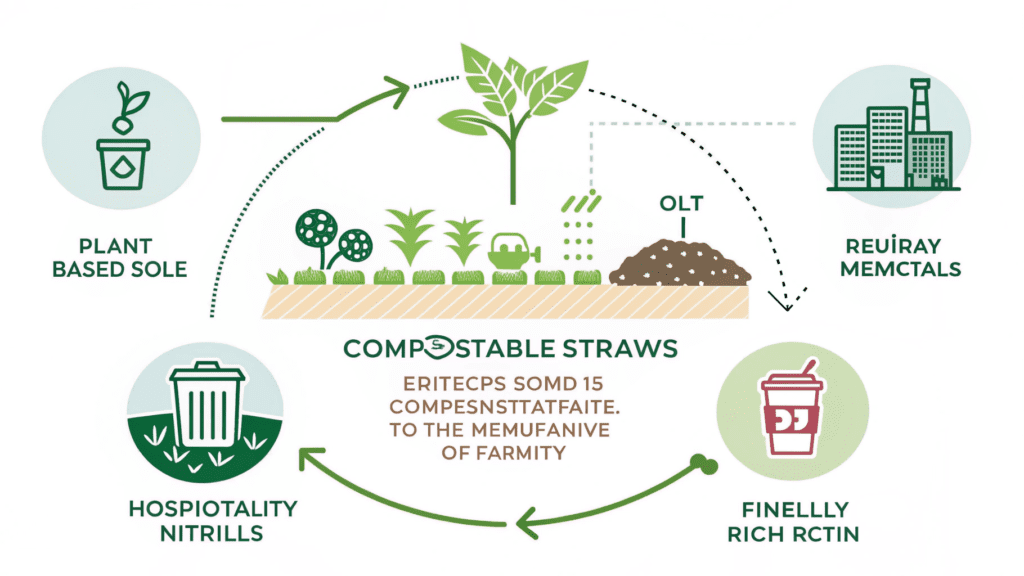
Strategic Considerations: Operational Impact & ROI of Compostable Straw Materials
For procurement managers and operations directors in hospitality, understanding the return on investment (ROI) and operational implications of different compostable straw materials is crucial for a smooth transition and long-term success.
| Fonctionnalité | Impact opérationnel B2B | Note de conformité | Potentiel de retour sur investissement |
|---|---|---|---|
| PLA | Requires reliable access to commercial composting facilities; ensures proper end-of-life management for the material. | Certified under ASTM D6400 and EN 13432 for industrial composting. Crucial for EU and US city-level compliance where plastic straws are banned. | Reduced landfill fees through waste diversion; enhanced brand image as a sustainably-minded enterprise; meeting immediate regulatory mandates to avoid fines and market access restrictions. |
| Pha | Offers the widest disposal flexibility, compatible with industrial, home, and even marine environments, simplifying end-user disposal instructions and expanding reach for diverse hospitality settings. | Biodegradable in diverse environments, supported by emerging certifications (e.g., BPI for certain PHA products). Positions brands as forward-thinking and fully compliant with evolving environmental standards. | Commands a premium brand positioning due to superior environmental attributes; future-proof compliance against stricter regulations; broader consumer appeal by addressing varied disposal options, potentially increasing market share among eco-conscious consumers. |
| Paper (Coated) | May require specific plant-based coatings for extended use duration, though some users report sogginess over prolonged periods. Often not recyclable due to mixed materials. | Certifications like BPI/EN 13432 for compostability. While plastic-free, ensure coatings are also compostable and avoid PFAS. | Cost-effective entry point to sustainability for many businesses; aligns with immediate consumer demand for plastic-free options, especially in quick-service environments. Can be a quick win for public perception and immediate compliance needs. |
| Bagasse de canne à sucre | Excellent durability for both cold and hot beverages, offering robust performance. Readily home or commercially compostable, simplifying waste streams for businesses and consumers. | High biodegradability, often certified home compostable. Utilizes agricultural waste, supporting circular economy principles and reducing reliance on virgin materials. | Strong positive consumer perception due to its waste-derived nature; contributes to significant reductions in landfill waste; demonstrates a commitment to sustainable sourcing, appealing to a growing segment of environmentally aware customers. |
| Edible (Rice/Seaweed) | Provides a true zero-waste solution; however, requires careful consideration for food safety, allergen management, and potential alterations to beverage taste. Storage and shelf life are critical operational factors for foodservice. | Requires food-grade certifications (e.g., FDA, EFSA). Complete consumption means no disposal required, aligning with ultimate sustainability goals. | Ultimate sustainability achievement and unique marketing differentiator; attracts niche markets and innovative brands; potential for new revenue streams if marketed as a consumable product, creating a distinctive competitive advantage. |
Choosing compostable straws impacts operations, compliance, and ROI, requiring strategic material selection for hospitality.
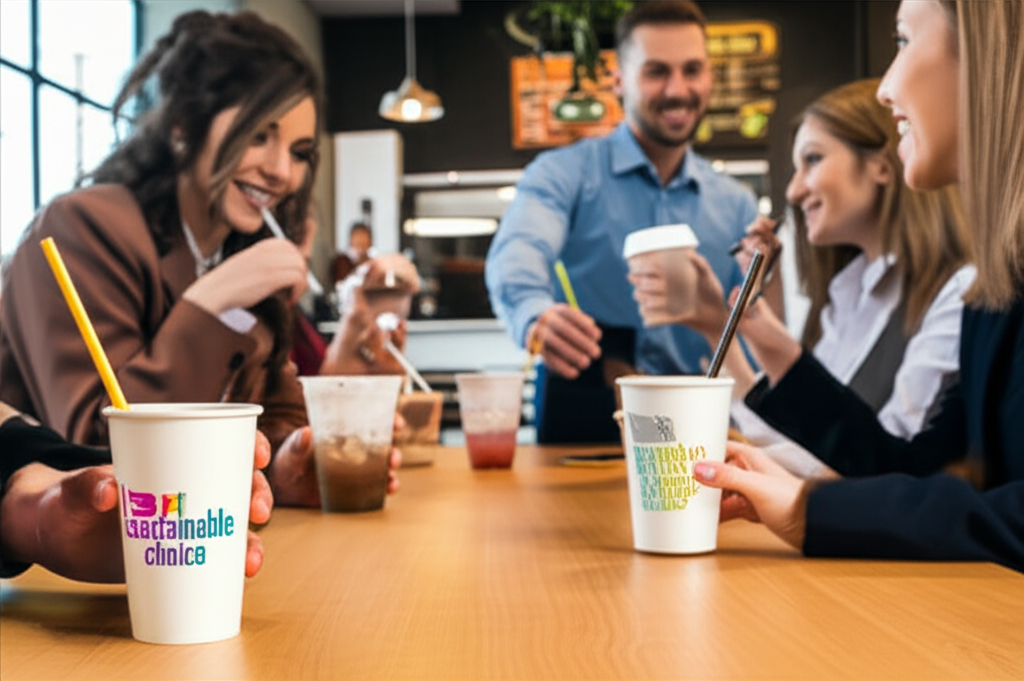
Addressing Challenges: PFAS and Regulatory Scrutiny in Compostable Straw Materials
While the shift to compostable materials is a positive step for hospitality, it is not without complexities. A critical challenge facing the “compostable” claim in some products, particularly paper and bamboo straws, is the widespread presence of Per- and Polyfluorofluoroalkyl Substances (PFAS).
The PFAS Problem: Undermining “Biodegradable” Claims
Recent academic research has uncovered a concerning truth: PFAS, often referred to as “forever chemicals” due to their extremely slow degradation—potentially over thousands of years—have been found in many seemingly eco-friendly straws. A study published in *Chemosphere* in April 2021 analyzed 38 biodegradable paper straw brands and found detectable PFAS in 36 of them, including common variants like PFBA, PFOA, and PFHxA. This finding was corroborated by a Belgian study published in *Food Additives and Contaminants* in August 2023, which identified PFAS in the majority of tested straws, predominantly those made from paper and bamboo.
The presence of PFAS fundamentally undermines the “biodegradable” and “compostable” claims of these products. If a product contains chemicals that persist indefinitely in the environment, it cannot truly be considered a sustainable end-of-life solution for hospitality waste streams.
Health and Environmental Implications of PFAS Contamination
PFAS are used to provide water, heat, and stain resistance, but their environmental persistence raises significant health and environmental concerns. Exposure to PFAS has been linked to a range of serious health issues, including lower vaccine response, thyroid disease, increased cholesterol levels, liver damage, kidney cancer, and testicular cancer.
Contamination can occur from various sources, including the soil where the plant materials were grown, the water used during manufacturing, or even intentional application as a water-repellent coating. For procurement teams in hospitality, this necessitates a critical shift in due diligence. It is no longer sufficient to merely ask for “compostable” certification; procurement managers must demand robust third-party testing for PFAS in all “compostable” products to ensure genuine environmental and public health integrity. PrioritizingBPI-certified compostable strawsthat are explicitly verified as PFAS-free offers a path to genuine compliance and consumer trust.PFAS contamination in compostable straws undermines sustainability claims, demanding rigorous testing for hospitality procurement.
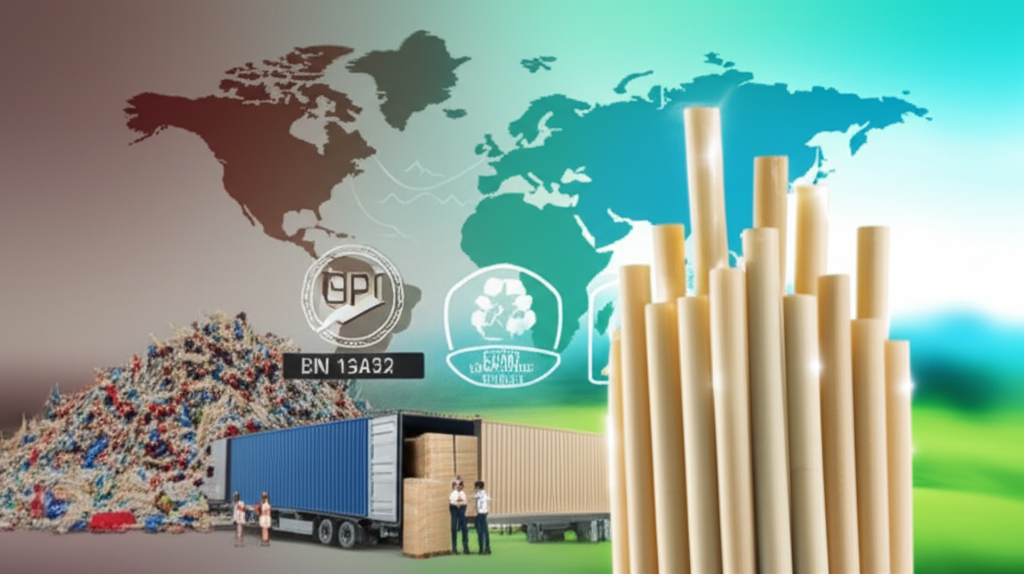
The Future Landscape: Innovation and Strategic Sourcing of Compostable Straw Materials
The journey towards truly sustainable packaging for hospitality and foodservice is dynamic, marked by continuous innovation and a growing emphasis on circularity.
Continuous Research and Development for Enhanced Performance
Ongoing academic and industrial efforts are focused on improving the mechanical strength, water stability, and heat resistance of plant-based materials. New frontiers in material science are exploring substances like chitin (derived from crustacean shells), zein (a protein from corn), and innovative starch-based blends, often incorporating natural additives like lignin and citric acid to enhance performance and overcome current limitations such as sogginess or specific composting requirements. The development of stereocomplex PLA (SC-PLA) aims to improve heat resistance and rigidity, expanding PLA’s usability. This relentless pursuit of better materials is crucial for meeting diverse operational needs while adhering to strict environmental standards in high-volume hospitality settings.
Driving a Circular Economy Through Responsible Sourcing
Compostable straws contribute significantly to driving a circular economy by diverting waste from landfills and oceans, which can then be returned to the earth as nutrient-rich soil. Sourcing these materials from renewable resources, particularly agricultural byproducts, further supports sustainable agriculture and reduces reliance on fossil fuels. This approach transforms waste into a valuable resource, closing the loop on material use for the hospitality supply chain.
For procurement managers and supply chain executives, this means prioritizing certified, transparent supply chains. Verifying that materials are sourced sustainably and that end products meet stringent compostability and safety standards (e.g., PFAS-free) is paramount. Strategic partnerships with suppliers committed to these principles are essential to ensure the true environmental benefit of compostable solutions. Discover howBPI compostable strawsoffer a compellinghospitality compliance and ROIsolution.Innovation and responsible sourcing of compostable straws drive circularity and enhance sustainability for hospitality.
Conclusion: Embracing Certified Compostable Straw Materials for a Sustainable Future
The transition to compostable straws is no longer just an environmental aspiration but a critical business imperative for the hospitality and foodservice industries, driven by escalating consumer demand, evolving regulatory landscapes, and the undeniable need for corporate social responsibility. By strategically understanding the diverse compostable straw materials, their specific operational impacts, and the stringent certification requirements, businesses can make informed decisions that safeguard their brand, ensure compliance, and unlock new market opportunities. Prioritizing certified, high-performance, and critically, PFAS-free options ensures genuine sustainability, enhances brand reputation, and positions your organization as a leader in environmental responsibility.
Act now: Evaluate your current straw procurement strategy and commit to certified, high-performance compostable straw materials to meet regulatory demands and achieve your sustainability goals before market access is restricted or consumer trust erodes.Embrace certified, PFAS-free compostable straws for genuine sustainability, compliance, and enhanced brand reputation.
Questions fréquemment posées
What is the primary difference between ‘biodegradable’ and ‘compostable’ straws for hospitality businesses?
Compostable straws are certified to break down into natural components within a specific timeframe (e.g., 180 days) under controlled conditions, leaving no toxic residues. Biodegradable is a broader, often unregulated term, offering no guarantee of complete, timely, or safe decomposition, which is crucial for hospitality’s waste management.
How do EU and US regulations impact the choice of compostable straws for foodservice supply chains?
The EU Single-Use Plastics Directive (2019/904) bans plastic straws, making certified compostable straws the only compliant alternative. In the US, while no federal ban exists, many states and cities have similar prohibitions, incentivizing certified compostable products to avoid penalties and ensure market access for foodservice.
What are the key benefits of switching to sugarcane (bagasse) straws for hotels and cafes?
Sugarcane (bagasse) straws are exceptionally sturdy, water-resistant, and often home compostable, breaking down in 30-90 days. They offer a durable, taste-neutral solution derived from agricultural waste, enhancing a hotel or cafe’s sustainability image and reducing landfill contributions.
Why is it critical for procurement managers to test compostable straws for PFAS?
PFAS (“forever chemicals”) undermine compostable claims, persisting indefinitely and posing health risks. Procurement managers must demand third-party PFAS testing to ensure genuine environmental integrity and consumer trust, especially for BPI-certified options.
How can hospitality businesses ensure their compostable straw sourcing aligns with circular economy principles?
Prioritize certified, transparent supply chains that source materials from renewable resources, especially agricultural byproducts. This diverts waste, reduces fossil fuel reliance, and ensures products return to the earth as nutrient-rich soil, closing the loop on material use.






